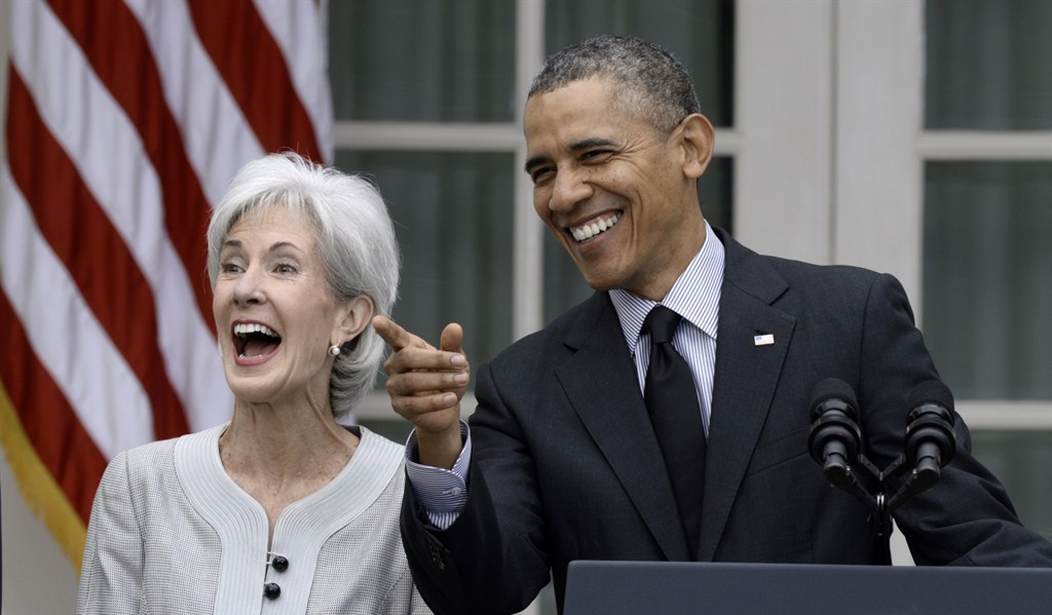Now that Barack Obama has formally backed Hillary Clinton for president, let's check in on how his signature domestic "accomplishment" is working for the American people -- bearing in mind that the policy was originally her brainchild. She agrees with Obama that the law is working, even as she struggles to adequately explain its obvious failures. Speaking of which, here's the lede from a fresh New York Times story entitled, "why do health costs keep rising? These people know:"
The Geisinger Health Plan, run by one of the nation’s top-rated health care organizations, foresees medical costs increasing next year by 7.5 percent for people buying insurance under the Affordable Care Act. So when Geisinger requested a rate increase of 40 percent for 2017, consumer advocates were amazed. And Kurt J. Wrobel, Geisinger’s chief actuary, found himself, along with other members of his profession, in the middle of the health care wars still raging in this political year...“Our rates for Medicare, Medicaid and employer-sponsored insurance have been relatively stable, but those products have to bear the cost of our losses on exchange business,” Mr. Wrobel said. Last October the Pennsylvania Insurance Department, headed by a former Obama administration official, approved a 20 percent increase in Geisinger’s rates, about half of what the company had requested. “But based on experience,” Mr. Wrobel said, “the 2016 premium rate is too low, so we want to correct it in 2017.”
Policy wonk highlighted the story above with this tweet:
Insurer @POTUS proclaimed a model for #Obamacare wants a 40 percent premium increase: https://t.co/FUb1hbxuGI
— Chris Jacobs (@chrisjacobsHC) June 9, 2016
Did Obama applaud this particular insurer 'a model' for his program? He sure did. Back to the Times:
During debate on the 2010 health care law, Mr. Obama and members of Congress repeatedly hailed it as a model providing “high-quality care at costs well below average,” in the president’s words. Geisinger serves residents of rural central and northeast Pennsylvania, and its roots in the community are as deep as the coal mines that once flourished here...It would be difficult to find a health plan more aligned with the goals of the federal law. The Obama administration recruited a former chief executive of the Geisinger Health Plan, Dr. Richard J. Gilfillan, to be the first director of the Center for Medicare and Medicaid Innovation, created by the health law to test ways to improve care and cut costs. Geisinger has been a pioneer in the use of electronic health records and genomic medicine, recruiting 100,000 patients for DNA sequencing studies in the last two years. It has embraced “pay for performance,” offering a warranty for major surgical procedures and promising not to charge extra if complications occur. But innovation has been no match for the actuarial surprises dealt out by the Affordable Care Act. Mr. Wrobel said Geisinger had simply underestimated how much care its new customers would need.
Recommended
And when aspirational wish-casting meets hard actuarial realities, bookkeepers request 40 percent rate increases. Meanwhile, Goldman Sachs analysts have confirmed what the nonpartisan CBO and others have long known to be the case. Namely, that Obamacare has had a decidedly chilling effect on America's employment picture. Ed Morrissey examines the new findings after running through recent paltry jobs and GDP numbers, which reflect Obama's sputtering recovery:
The number of part-time workers in jobs for economic reasons shot up by 468,000, apart from the 458,000 that left the workforce altogether. Slack work or business conditions accounted for 181,000 of these jobs, while another 77,000 could only find part-time work. Analysts at Goldman Sachs have noticed this trend for some time, and put the blame on Obamacare. “The evidence suggests that the [Affordable Care Act] has at least modestly elevated involuntary part-time employment,” Goldman Sachs economist Alec Philips wrote in a research note published on Wednesday. Obamacare had the greatest impact on industries that traditionally do not offer strong health insurance coverage, such as retail stores and the hospitality industry. Phillips noted that these have the highest levels of involuntary part-time workers, and believes that the ACA has forced “a few hundred thousand” to take cuts in hours or accept part-time work as a result...As Joseph Lawler noted for The Washington Examiner, the number of people forced into part-time work has grown by over 600,000 people in the last seven months. It’s not getting better – it’s getting worse.
Faced with the Obamacare-caused dilemma of older and sicker-than-expected insurer risk pools, and the rising financial losses associated with covering that group, the administration is moving to ban a popular form of insurance coverage to try to coerce younger, healthier people to enter the exchanges they can't afford. The heavy hammer of regulation swings again:
Short-term health insurance soon could get a whole lot shorter. Federal officials Wednesday moved to improve the financial outlook of Obamacare insurance plans by calling for limits on increasingly popular short-term health plans that are siphoning off healthier customers from coverage sold both on government marketplaces and outside those exchanges. The government's move would limit short-term health coverage for an individual to less than three months each year and bar renewal, as opposed to the almost 12-month term that some of those non-Obamacare-compliant plans are offering, along with a chance to renew.
I'll leave you with this bleak Obamacare snapshot out of the battleground state of Colorado:
Colorado: Insurers flee #Obamacare markets, nearly 100k to lose coverage, w/ double-digit '17 premium hikes coming.https://t.co/hbpUbKoEhc
— Guy Benson (@guypbenson) June 9, 2016
























Join the conversation as a VIP Member